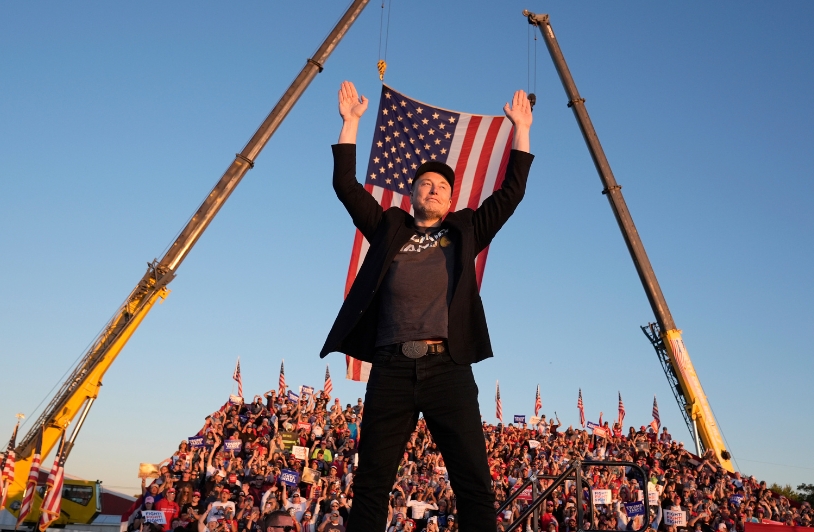Conflicts of Interest, Security Clearance Issues, Lack of Protocol … Meh
Who elected Elon Musk?
What is an outspoken billionaire with a million conflicts of interest with the rules of government doing as Donald Trump’s shadow? Did he replace JD Vance or Melania to be at Trump’s side through job interviews with potential Cabinet members and on the phone with foreign heads of state?
Does Musk even have a White House security clearance – or are we just brushing away such legal niceties in a time of personal loyalties to Trump? Does “best buddy,” as Musk has now taken to calling himself, now mean that he is set to speak the policy words that come out of Trump’s mouth?
Maybe Musk, who is seen both as a brilliant engineer and a wild card as an outspoken social scientist, is popping up well beyond this celebrated leading role — along with former presidential candidate Vivek Ramaswamy, a pharmaceutical businessman — in looking at federal spending and organization, in places and roles that feel well beyond the role of even a close advisor. The so-called Department of Government Efficiency is meant to be an out-of-government, private counsel on cutting upwards of two trillion dollars from the federal budget. The Washington Post added reporting that aides are considering how to outrun normal congressional procedures on how money is appropriated.
As The New York Times notes of Musk, “The world’s richest person has ascended to a position of extraordinary, unofficial influence in Trump’s transition process, playing a role that makes him indisputably America’s most powerful private citizen.” The Times reaps incidents in which Musk in effect has substituted for a missing Melania in Trump family photos and is being greeted at Mar-a-Lago, where he stayed this week, with standing ovations.
Musk has taken an active role in deciding Senate leadership, Cabinet picks — including vetoing some candidates — and setting foreign policy priorities. He has joined Trump on calls with leaders of Turkey, Ukraine and plans to meet with the Argentine president.
On Monday, The New York Times reported, Musk met with Iran’s ambassador to the United Nations in New York in a session that two Iranian officials described as a discussion of how to defuse tensions between Iran and the United States. With what authority is this private citizen having these talks; the Logan Act says it is illegal to do so.
It’s all happening without formal portfolio.
Conflicts Galore
Musk has conflicts with government regulation as a result his ownership of social media company X, his space program and Tesla businesses, his cryptocurrency investments and lots of other areas. As a private citizen, of course, he need not meet any requirements to divest or distance himself from those financial and regulatory interests before advising Trump. Musk has a big entry foot into artificial intelligence development, another area where regulation is pending during the Trump years.
In turn, Musk’s network of friends and business partners includes Silicon Valley executives and international investors who all have direct interests in decisions made by an incoming administration. Musk’s million-dollar giveaways to individual voters for supporting candidate Trump and his political objectives flirted with violation of criminal laws.
There’s a through-line that the world’s richest man and his friends are unaccountable for any out-and-out influence they are exerting on an incoming president-elect — himself a character who is resistant to following established norms.
Some television news reports were hinting that other Trump insiders are offput by Musk, who they see as overstaying his early Trump welcome. Frankly, I don’t care about their bruised feelings, I care about whether we have a shadow president — someone himself ineligible to run for president.
Apart from all else, Musk has a mixed business record that reflect brilliance in applied science and a tin ear when it comes to supporting even his own people. He rejects collective bargaining, and his style reflected in the acquisition of Twitter was to overpay, then fire anyone who knew how to run the operation, turn up the political noise in the name of free speech, and then complain about the subsequent drop-off in business and profit. Shall we apply the same to Social Security and Medicare/Medicaid or meat inspections or the defense department? Shall we cancel fixing roads and bridges?
U.S. spending at-a-glance says we spend $6 trillion a year. All but $1.7 trillion are required by law, including debt payments and the social entitlements programs. Trump plans to deepen debt with tax cuts and basically bring in fewer tax dollars, regardless of who benefits, and huge costs for his immigration and deportation programs and new defense spending. Squaring this uneven circle seems harder work than justified by sloganeering.
Trump can have whatever friends he chooses to keep around him, I suppose. He can get ideas from whomever he chooses. But somewhere in that mix of formal and informal sources of government re-shaping, there is a requirement to come clean with the American public.
The democracy is not supposed to operate as a family parlor game.




